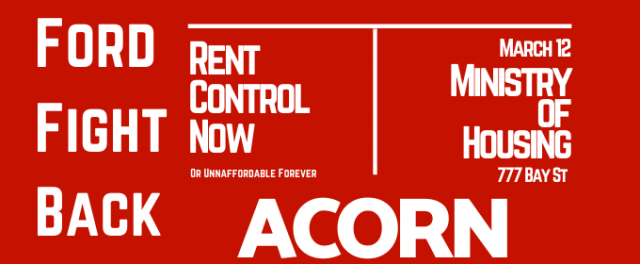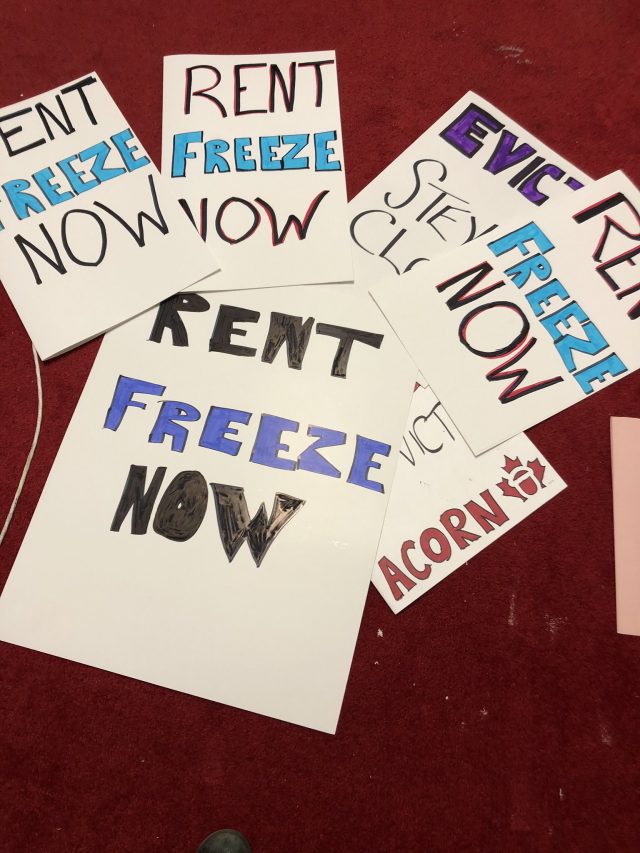
As part of our “Let’s Improve the Ontario Rental Industry” we have invited landlords and tenants to share their opinions on how we can make these improvements. These opinions are from individual contributors and are not the opinions of the Ontario Landlords Association. We believe by fostering communication between landlords and tenants we can improve the Ontario rental industry. Landlords and tenants can share your thoughts and opinions by emailing us at landlordtenantsolutions@groupmail.com
Critique My Plan Not To Pay Rent For 8 Months
I asked that my situation be posted to help other victimized tenants who find ourselves paying so much money to landlords.
We cannot afford to get out the viscous circle of working hard just to have a place to live and the landlord is taking so much money from us. It is like a drug dealer making money of people who need drugs because they are addicted.
Tenants in Ontario have almost no one to help us and the vacancy rates are so low and rents are so high we need to work together and help each other.
While landlords can use our rent money to hire lawyers and have all the politicians in their pockets tenants need to stop fighting and finally create a unified voice to stop being exploited.
I’m Not Moving
Where I live is like a home to me and really comfy and convenient. My boss lives near here and can pick me up to go to work and take me home which is a huge bonus. So no way do I want to move, but am just short of money due to unforeseen consequences which are not my fault.
I will move in January 2019 because after some time trying to make money it’s back to school for me and here are no half-decent unis here. Education is expensive and paying for a place to live means money. Add in books, clothes, money for nightlife and any money to be saved will mean a jump start for my future and my life enjoyment.
After lots of study here is what is on the table:
JUNE 1
1. On June 1st I just don’t do the normal e-transfer to my landlord.
2. If the landlord calls me I need to answer as part of my way to delay everything. So I’m going to make an excuse.
This is what my script is so far (suggestions welcomed!):
“Oh geez I’m so sorry about this. You know me and how we get along and I want to stay here a long time. It’s just that my work screwed up the system and I didn’t get my salary this week like I always do! It’s crazy now with so many computer screw ups and I’m mad as hell about it. The good thing is my boss said the money will be arriving in my bank account soon.
The only reason I didn’t call you yesterday is because the money should be in my account now! I’m sorry about it and the money will be coming soon. How’s your summer going? I’m going to clean up the lawn and plant some flowers if you don’t mind (bullshit, bullshit, bullshit to throw her off the scent!)”
3. I try to delay this as long as possible and think I can string her along until the 3rd week because I know she doesn’t want me to move and have to spend the time and energy of finding someone else to take his place. She knows she would lose at least a month or two trying to fill it.
And she won’t want to pay to clean it up because the place is a bit weedy if you know what I mean because some of my friends and I light it up on the week-ends and smoke a few joints.
4. I call and say “good news I’m getting double pay on July 1 so you will get two months of rent. I’m sorry about this (blah, blah, blah). So June uses my last months rent I paid and now the rest is gravy.
JULY
5. I don’t send the e-transfer again with the landlord expecting 2 months of rent. Best move (I think) is to continue to delay.
But I’m sure she will eventually give me the N-4 form to pay or leave. So let’s say I get that on July 2nd. The N-4 gives me 14 days to pay and there is nothing the landlord can do about it.
Now we are at July 17.
The landlord will have to file an L1 to take me to the Landlord and Tenant Board. I called the LTB and found that these eviction trial dates take at least 6 weeks to be held. So that would lead me to around September 3rd to 10th.
STATUS REPORT:
-Last month rent I paid when I moved in used for June
-No rent payment needed for July
-No rent payment needed for August
-No rent payment needed for September
This means the landlord doesn’t have any of my hard earned money and there was no need to pay for July/August/September rent.
LTB EVICTION TRIAL STRATEGY
I read here and now realize tenants HAVE TO ATTEND to defend ourselves. If not we could get an unfair decision.
I also read we can get a free lawyer at the LTB at the day of the eviction trial. We just need to go a bit early and wait for the free tenant lawyers or paralegals to call out they are seeing people and will represent us against the landlords.
The best way to avoid getting kicked out is to create some maintenance claims because under the law landlords are responsible for all maintenance and repairs and my enjoyment of the property:
“The reason I didn’t pay rent is because the landlord refused to fix things and it has made my life a nightmare, especially as a young person who is struggling with perilous employment and health issues.”
The strategy is to get my girlfriend who is living here with me to act as a witness and we are going to have documentation:
-the toilet doesn’t flush so we can’t even use the bathroom
-it’s so hot and the bedroom windows don’t open all the way and i makes it even difficult to sleep
-there are ants on the patio and they keep coming in and the landlord won’t do anything about it
-etc.
Remember that one tenant on the forum told me “no house is perfect” so this will void the Eviction trial and the landlord will have to fix things and I will give them one month to do it, so that will cover October rent and I will agree to pay once the repairs are done.
OCTOBER
I won’t pay rent and will file with the LTB and tell them the landlord didn’t make the repairs up to my satisfaction and will have my girlfriend as a witness.
I will give the landlord 30 more days and demand she brings EVERY person she hired to testify in person at the LTB (good luck with that) and also demand that if any of them are not licensed and insured I don’t feel same in my home.
NOVEMBER
I’m sure the landlord will file for eviction and I will counter with a tenant rights complaint about more needed repairs in the apartment. This should give me at least another six weeks.
JANUARY 2019
At this point they will probably try to get the sheriff or whatever it is to evict me but I read here that is also very slow and can takes week. Anyways I don’t really give a sh*t because I’ll be leaving at the end of the month to go to school.
STATUS REPORT:
-Last month rent was used for June
-No rent payment needed for July
-No rent payment needed for August
-No rent payment needed for September
-No rent payment needed for October
-No rent payment need for November
-No rent payment needed for December
-No rent payment needed for January
CONCLUSION
Pretty sure this will work and only me a couple days at the LTB. Hoping others experienced with this will chime in to help me perfect my strategy.
I will eventually pay my landlord once I get a secure white collar position but right now it’s all about my survival and MY FUTURE! I will follow up on how things are going and will continue to take a stand for tenant rights in Ontario!
















